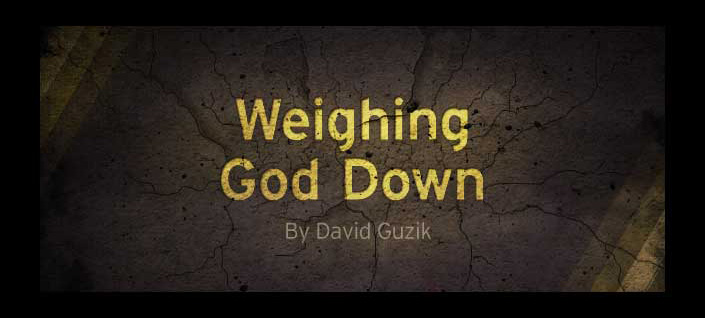
A common idea in the Psalms is that we can and should bless the Lord. Of course, we can’t bless God in the sense that a greater bestows a blessing on a lesser, because God is the greater and we are the lesser. In that sense He blesses us and we cannot bless Him. But the idea is in a different sense in the Psalms, the sense that we bless God by worshipping Him and pleasing Him. We bless Him by being a blessing unto Him with our worship, our words, and our life. It’s a beautiful idea that we can bless God in this way.
Yet there is a passage in the Book of Amos that gives almost the opposite sense. Instead of being a blessing to God, Amos spoke for the Lord and told God’s people that they were aweight to Him. In Amos 2:13, God said to His people: “I am weighed down by you.” At that time God regarded the people of Israel as a weary burden and not as a joy. It is like the difference between the pleasure a parent feels in dealing with an obedient child and the drudgery a parent feels in dealing with a stubborn, rebellious child.
We understand that Amos speaks in figures of speech. We can’t say that men oppress God. We shouldn’t think that God paces the throne room of heaven, full of worry because people are such a trouble to Him. Yet we appreciate that Amos speaks to us in the manner of men, telling us that God can be so pressed by the sin of man, especially the sins of His people, as if He were “weighed down” by them.
Any time justice is perverted – any time the rich receive preferential treatment or the poor are oppressed – it burdens the God who sees from heaven and He promises to set it right. Any time people cheat and manipulate and make money off others in questionable ways – even if it is legal – it burdens the God who sees from heaven and He promises to set it right. Any time people unfairly profit at the expense of the unfortunate, it burdens the God who sees from heaven and He promises to set it right
What will God do with this weight? He will eventually, after much patience and longsuffering, bring judgment against those who have weighed Him down. That’s what Amos means (2:14): “Flight shall perish from the swift, the strong shall not strengthen his power.” One way the judgment of God would express itself against Israel was that they would find themselves unable to succeed in ways they previously thought they were strong.
Without the blessing of God, the swift isn’t fast enough, the strong isn’t strong enough, andthe mighty isn’t mighty enough to succeed. Israel was far too confident in their own ability, but God would bring them low.
We can escape this judgment by realizing now that even our strength is nothing without God. Paul communicated this idea in 1 Corinthians 10:12: Therefore let him who thinks he stands take heed lest he fall. We can become more vulnerable in our perceived strengths than in our acknowledged weaknesses because we are on guard with our weaknesses.
The better way is to never let it get to that place of judgment by never weighing God down. Instead of pressing a burden on God by disobedience and mistreatment of others, be a blessing to Him.






